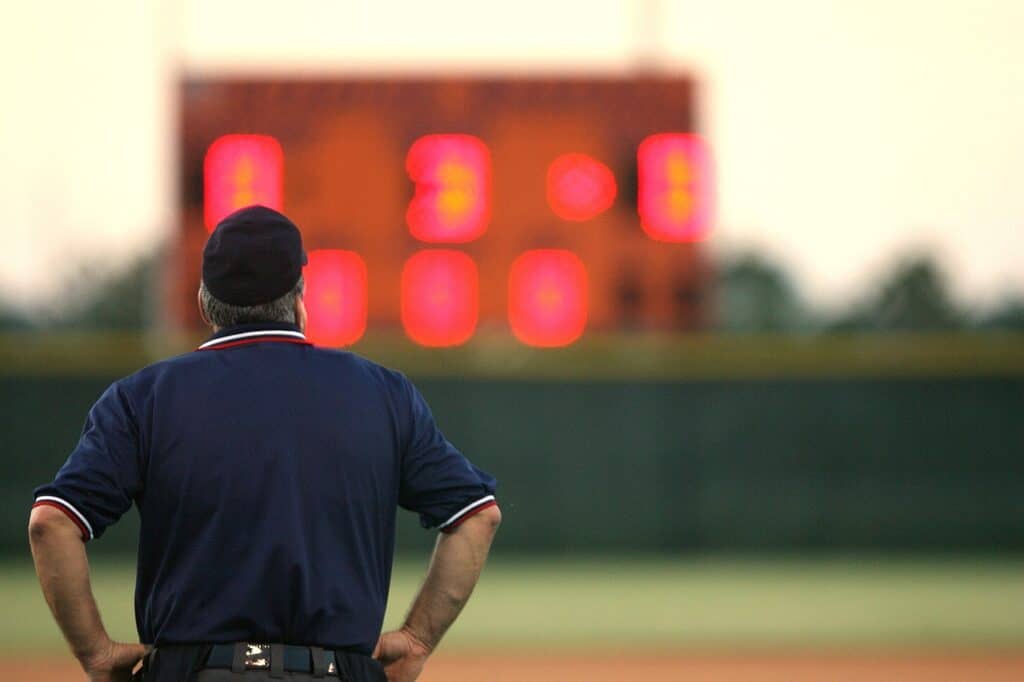Unlike many sports where games can end in a draw, baseball typically plays until there is a winner. However, certain circumstances, like weather conditions or darkness in stadiums without lights, have historically resulted in ties. Let’s delve into how baseball addresses the concept of a tied game under its rules.

POINTS
- There are a lot of sports where games can end in a tie, but it is complicated if baseball games end in a tie.
- If a game is tied after five innings and it is postponed because of weather, it will resume either the next day or the next time that the two teams meet.
- Baseball games used to end in ties more frequently because there was lack of light.
- The last time that a game ended in tie was 2016 between Pirates and Cubs due to weather conditions.
Some history
Baseball games used to end in ties more frequently. The reason for the ties? A lack of light. Before stadiums were equipped with lights, games were played until it was too dark to see. Sometimes games were continued the next day and sometimes the games just ended in a tie.
With the addition of lights, teams were able to play longer and later. Eventually, a winner is determined and the season continues.
How have ties happened in MLB?
Weather is the biggest complication in baseball games. If there is a force that could compel a tie, it would be Mother Nature. Games can have rain delays, or other inclement weather, forcing the teams to resume play at a later date.
If the game that gets postponed is the last game of a series then the two teams may resume playing the next time they are scheduled to play each other. However, in some cases, the two teams may not meet again. In this case, the game would be resumed at the end of the season.
How has MLB decided tie games?
Since most games that were tied were games that were postponed because of weather, most tie games were resumed the next day. Worst case scenario games were resumed at a later date beginning at the point in which the game was postponed.
The last time that a game ended in a tie was in 2016 between the Pirates and the Cubs. The game was postponed because of the weather. Towards the end of the season, it was determined that the game no longer needed to be played as the outcome would not affect the postseason picture positively or negatively.
The Cubs ended the season with the best record in the National League and the Pirates had been eliminated from playoff contention. If the game would have had an impact on the playoff standings then they would have resumed the game and played until a winner had been determined. The statistics accumulated in the game did count.
In 2002, the All-Star Game ended in a tie much to the dismay of the fans. In this case, the managers ran out of pitching and were fearful of causing injury to players. For that reason, the game ended in a tie. However, a regular season or postseason game would not end this way.
Do statistics count in a tie game?
Although ending in a tie is very rare, the statistics that were compiled in the game would count towards individual and team totals. If the game counts, then the statistics from that game count as well. This is different than a game that gets postponed in the 2nd inning and then is not completed later. The statistics from an incomplete game would not count.
Extra innings and tied games
Every sport handles ties in different ways. Soccer can have shootouts, basketball goes into overtime, football goes into overtime, and then sudden death overtime. Baseball goes into extra innings.
The way baseball works is that if a game is tied after nine innings, the game will continue until one of the teams is winning after the end of the inning. If they are still tied after the end of an inning then the game will go into the next inning.
Often the games are decided after an extra inning or two, but occasionally they will stretch into double-digit extra innings. The longest game on record dates back to 1920 – when the Dodgers and Braves played 26 innings. The game was called after 3 hours and 50 minutes because of darkness. Ironically, it ended in a 1-1 tie.
Playoffs and ties
In the postseason, there are no ties. Games will be played until a winner is determined. All stadiums have lights now, so the games are not called because of darkness. However, there have been times that the games have been delayed or postponed because of the weather. Nonetheless, if a game is delayed, it will be resumed at a later time or day and play will continue until a winner has been decided.
Should MLB games end in ties?
While it seems as though 162 games offer plenty of opportunities for divisions to be decided and the playoff field to be drawn, adopting ties as a natural course of the season could make a long season even longer.
Some would argue that adding ties to the MLB repertoire could save pitchers’ arms, but there isn’t evidence to support that notion. A better argument could be that it would shorten the game time, but again the evidence doesn’t truly support that idea either. Roughly less than 10% of baseball games go into extra innings.
Baseball fans want to see an outcome to a game. That’s part of the excitement. You want to see that walk-off hit or walk-off home run. You want to see a closer come in and strike out the side.
Ending in a tie would be anti-climatic. It is also not a part of baseball tradition. Soccer, hockey, and even football fans are used to the chance of the game ending in a tie. This is a variable that probably would not sit well with the average baseball fan.
In addition, it appears that baseball may be implementing new rules to speed up extra-inning games and increase the chances of scoring. In the meantime, we will leave the tying to other sports. Stay tuned for the walk-offs and game-ending saves.
 Written by Mark Bailey
Written by Mark Bailey